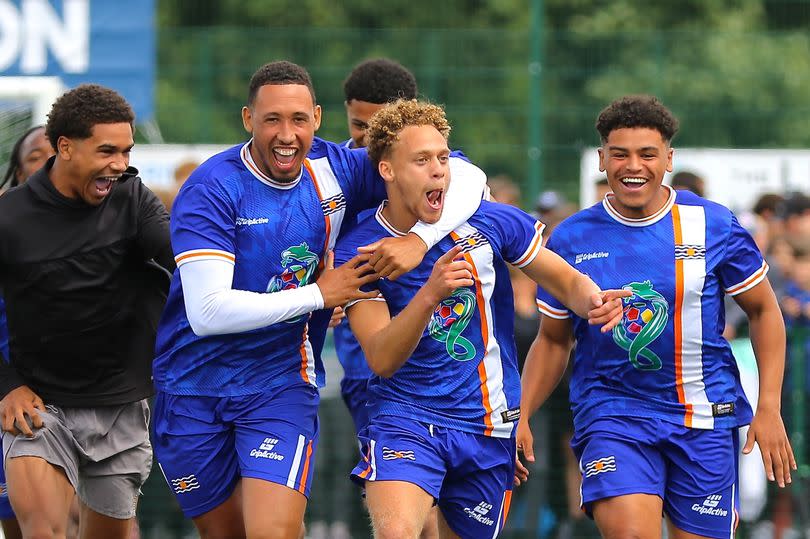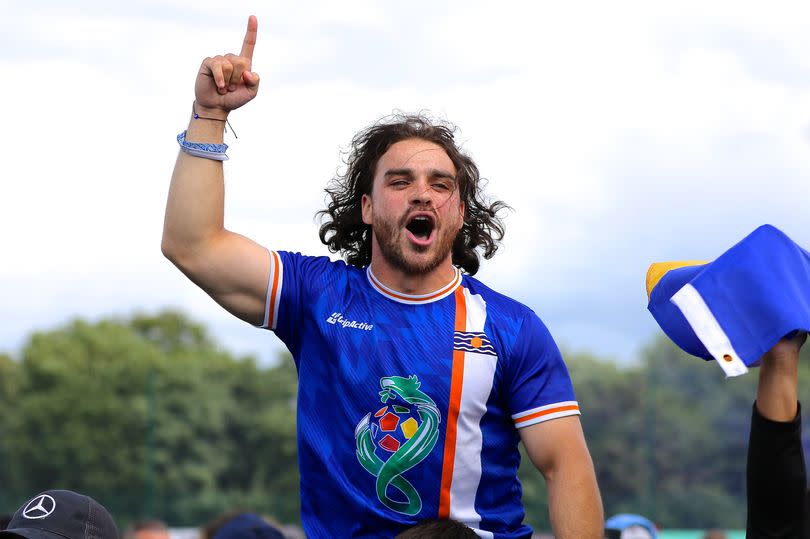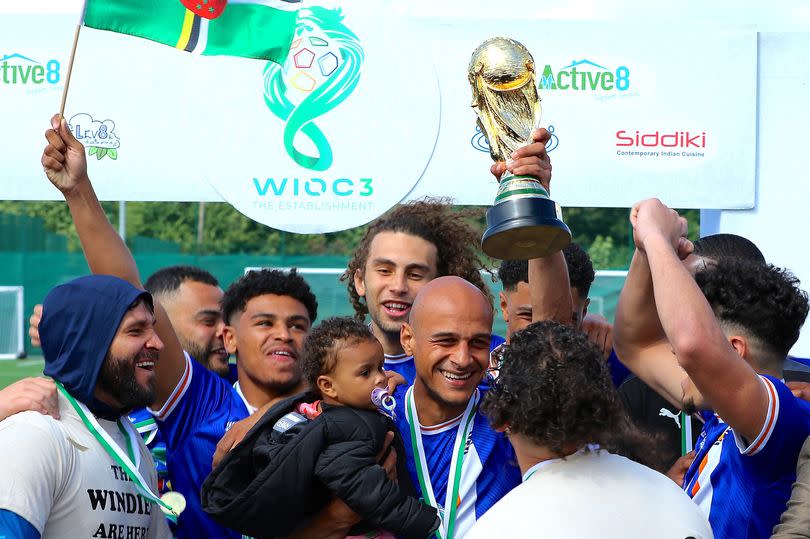Liverpool already has a world champion - but FIFA cannot recognise it

Viv Richards, Joel Garner, Chris Gayle and Brian Lara are all heroes and icons after their successes for West Indies Cricket Team.
Both Richards and Garner played starring roles in Windies’ 1979 World Cup triumph after beating England by 92 runs in the final at Lords.
Since then, they have tasted success three times - twice in the ICC T20 World Cup (in 2012 and 2016) and in the ICC Champions Trophy 20 years ago.
READ MORE: I run a World Cup for local communities but Trent Alexander-Arnold has taken it to the next level
READ MORE: World In One City 2024 tournament kicks off
But West Indies football has rarely been in the headlines until 2023 when the likes of Leon Arnasalam, Liam Caddick, Stephen Duke-McKenna and Craig Ellison etched their names in their own slice of history - winning the World in One City.
The tournament, held at Jericho Lane, features 16 nations with representation from across Liverpool, Merseyside, the North West and around the world. The competition celebrates multiculturalism in the city with the likes of Somali Team, Yemen, Jamaica, Nigeria and England among those taking part.
West Indies, managed by Curtis Lopez, avenged their final defeat in 2021 to beat Yemen on penalties last year to become champions at the third time of asking. On Merseyside, the success resonated around the region but globally, a competitive West Indies team is unheard of, if not impossible.
From a football perspective, West Indies aren’t recognised by FIFA, CFU or CONCACAF, which automatically makes it difficult to compete in the World Cup or competitions within the region.
The subregion of North America comprises of 13 independent island countries and 19 dependencies in three archipelagos - within those are Cuba, Jamaica, Saint Lucia, Saint Vincent and the Grenadines among others, all of which are independently recognised and affiliated within CONCACAF, FIFA or CFU.

Despite that, there have been efforts to spark a West Indian Football Association [WIFA] with James Baird spearheading the move. Baird, 41, was a goalkeeper during his playing career spending his youth career with the likes of Livingstone and Alloa Athletic.
His senior years came in the lower leagues within Scotland, with a spell in the Faroe Islands wedged in between, before moving to the Caribbean in 2008 - where he has lived ever since.
The shot-stopper moved into management roles around Trinidad and embarked on looking to ignite a West Indies football identity. During that time, the Scot faced challenges - such as financial restrictions - after organising hubs and programmes.
However, family matters and other job roles took a priority for Baird, who did manage to sign WIFA to the N.F.-Board, a federation for teams that represent nations, dependencies, unrecognized states, minorities, stateless peoples not affiliated to FIFA, before stepping aside.
He told the ECHO: "I did reach out to them but I always knew it would be a non-starter at the beginning because with CONCACAF you have to be an individual country, with the West Indies combined, we’d combine all the countries of CONCACAF.
"To allow a team which had every country, it wasn’t something that they didn’t do. I did have conversations at the beginning and CFU but because FIFA has those competitions, it didn’t happen.
"We did have conversations with the Island Games, along with the N.F.-Board, there was that option of playing but would’ve been a bridge too far. We’d have to have our own country or find a niche country that wasn’t playing together as a complete group."
Ultimately, the plan couldn't get off the ground despite over 600 players participating with interest in Sweden and England too.
The plan wasn't entirely a success in the Caribbean but Futsal teams were unearthed, under the West Indian umbrella, from the idea which have been a success in London.
On the other side of the world, Baird is left heartened by the success of West Indies.
"It's a fantastic thing," he says. "Not only does it give them an opportunity to represent West Indies but it gives them the chance to keep playing the game, representing their own individual countries as well.
"I think it's a great what's happening."
Cricket dominates the landscape in the Caribbean, but football is growing.
In Merseyside and the North West, there are cases of players going on to represent their country on an international level.
Neil Danns, formerly of Leicester City and Tranmere Rovers, made 25 appearances for Guyana with Liverpool-born Stephen Duke-McKenna, who plies his trade at QPR, earning a call-up to the squad.
Josh Solomon-Davies was apart of the World in One City-winning West Indies side and has missed the opening two matches in the tournament due to his involvement with Saint Lucia.
Trinidad and Tobago represented the Caribbean in the 2006 World Cup, facing England in the Group Stage, as the Three Lions needed two late goals from Peter Crouch and Steven Gerrard to avoid a scare against the minnows, with Panama involved in the 2018 World Cup.
The standard of coaching and playing has improved drastically in the Caribbean in the last 18 years thanks to various initiatives from FIFA and other governing bodies.
Over 7,000 kilometres away, the West Indies has its own world champion in Liverpool after their triumph in 2023.
Although the journey to get there is an orthodox one. On the astro turf, Windies have been beaten finalists and knocked out in the last-16 before their dramatic win over Yemen, last year.
Initially, Tournament organiser Imad Ali approached Lopez around the competition's inception to piece together a Saint Vincentian team, before a Barbados team was pitched until the decision was made to combine the region to make the West Indies.

There’s a bubbling rivalry with neighbours Jamaica, who boast alumni such as Kane Drummond - who recently earned a move to the Football League from Macclesfield - last year's World in One City golden boot runner-up with four goals.
The Caribbean community aspect is once again thriving, says Lopez: "We’re getting to the point where it’s more second and third generation, my dad came here in 1963 so as we were growing up, the community was thriving.
"People probably came over here to rebuild after the war, the Windrush generation essentially, that’s the way it was. We got the Caribbean centre, at the top of Parliament Street, so a lot of our days were all there and went on for years.
"It’s probably only the last 15 years or so when the community hasn’t totally dwindled, the first generation has passed on then you look at our lads now, it’s their grandads because they’re only 18, it’s nice to see. The community itself is back, the Caribbean centre had a lull period but everyone’s doing something for it."
This year’s edition has kicked off and already has the billing to exceed the previous three tournaments. West Indies and Nigeria have booked their place in the knockout stages thanks to wins in their opening two group matches - setting up for the blockbuster in their final match on Monday (June 17).
One-time winners England made an early statement with an emphatic win over rivals Ireland while the likes of Yemen, Somali Team and Rest of the World look to assert themselves in the tournament.
West Indies are among the early tournament favourites, with Nigeria, but the story of their rise is as unique as it is eye-catching as they became winners of the competition despite not being recognised officially by FIFA, CONCACAF or the CFU.
The importance of the triumph holds just as much strength as any accolade too, Lopez adds: "It’s the power of football, it brings people together.
"You go down to the levels where we are, you see what it means to people but we’ve got a brilliant community in football and when something goes wrong, everyone pulls together.

"It was brilliant (to win), there was no other way to describe it. When I went to St Vincent years ago, people played cricket and football wasn’t massive.
"I’ve got family over there regularly, I send them the articles that have been published and they send messages of good luck, I’ve got brothers and sisters from before my dad moved here wishing us luck and seeing it - it’s brilliant.
"The celebrations were boss, a lot of neutrals probably got off, we had a good celebration and for the black tie event, we got an open-top bus.
"We went around each of the different communities that we beat and put a flag on the wall outside.
"We sent some videos and they were just buzzing to see a winning football team but they asked the question about why it isn’t St Vincent so I explained it to them - football isn’t as big as cricket but it’s growing.
"When the islands play each other, St Vincent aren’t as good as Guyana or St Lucia and definitely not as good as Jamaica or Trinidad - they’re the big ones. On the success of World In One City, hopefully we won't have to wait too many more years to see another Caribbean country grace the World Cup."

 Yahoo Sport
Yahoo Sport 






































